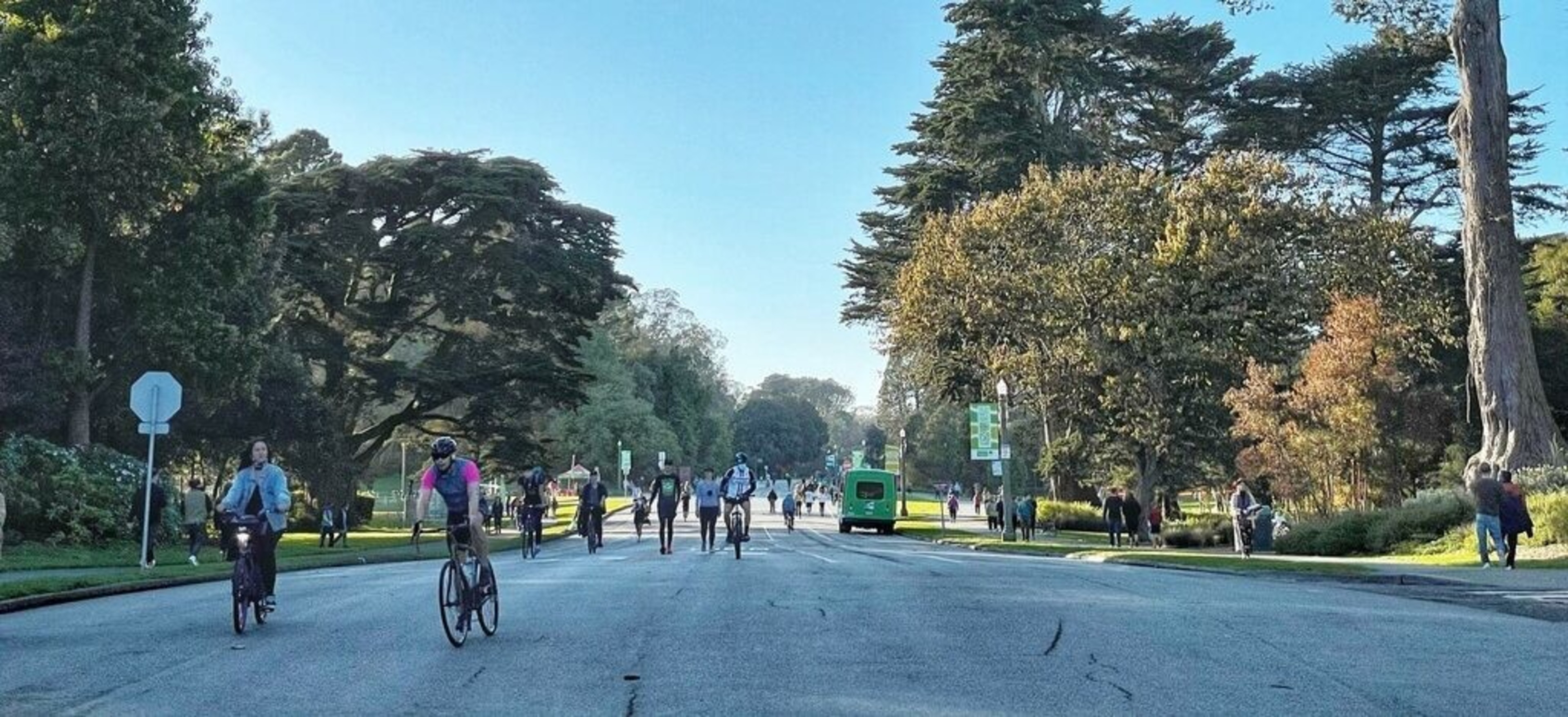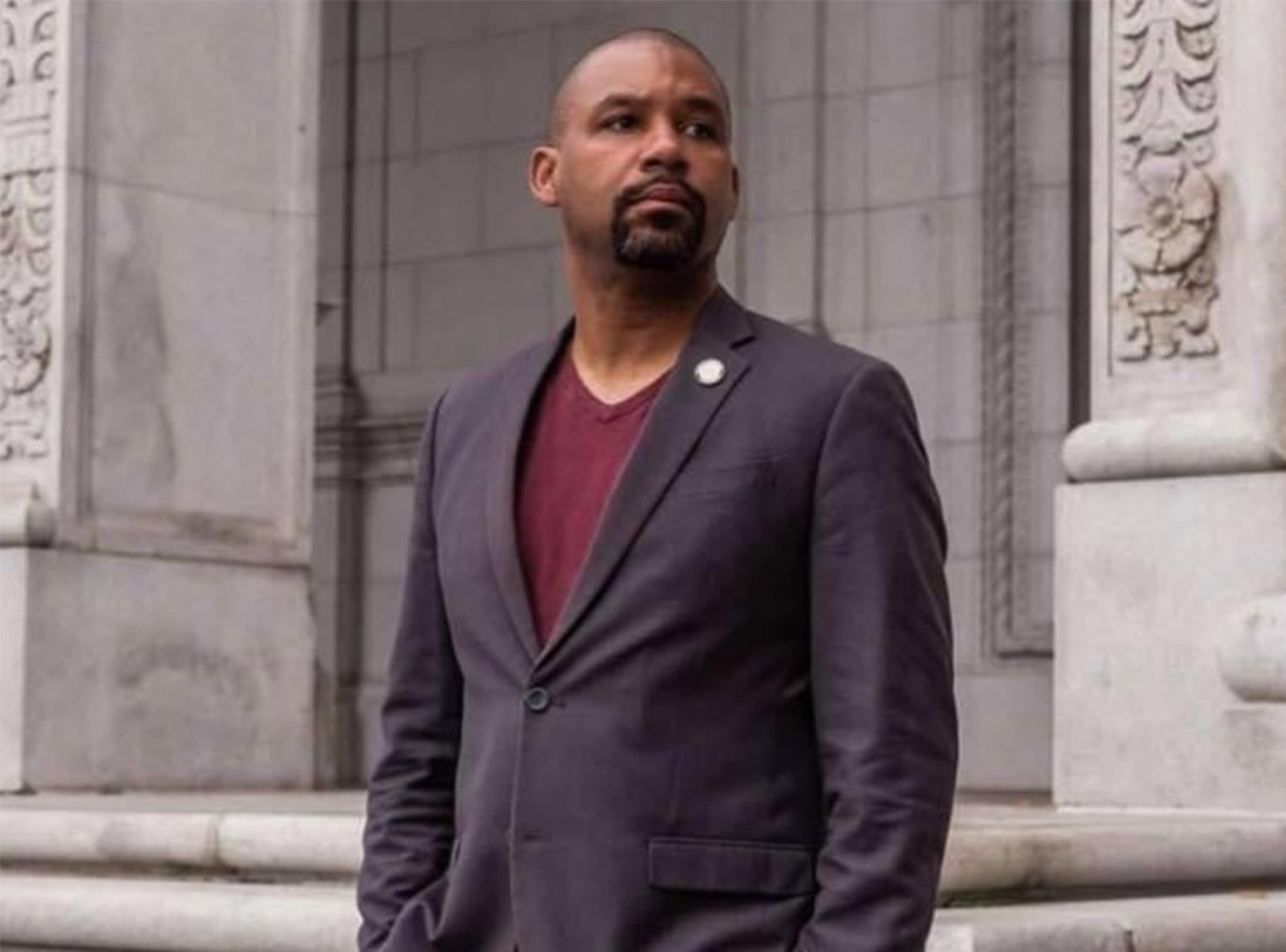Last April, in the early stages of the pandemic, Mayor London Breed announced (opens in new tab) that a portion of John F. Kennedy Drive in Golden Gate Park would be closed to car traffic to provide more space for social distancing. The decision was music to the ears (opens in new tab) of community organizations like People Protected (opens in new tab), Walk SF (opens in new tab) and the San Francisco Bicycle Coalition (opens in new tab), which advocate for safer streets that prioritize pedestrians and bikers over vehicles. And while the closure was only ever meant to last (opens in new tab) until the end of the city’s emergency health order, many who’ve enjoyed the car-free roadway are now advocating (opens in new tab) for the change to be made permanent.
But not everyone agrees, including Board of Supervisors President Shamann Walton (District 10), who made the news recently (opens in new tab) for saying that JFK’s closure is an example of “segregationist” policy. Supervisor Ahsha Safai (District 11) also believes the roadway should be opened back up to cars (opens in new tab), echoing Walton’s concerns that a vehicle-free section makes the park less accessible to families that don’t have the privilege of using a bike or access to adequate public transportation.
On the other side of the debate, Supervisors Matt Haney (District 6) and Dean Preston (District 5) both (opens in new tab) tweeted (opens in new tab) their support for a permanent car-free JFK, as did State Senator Scott Wiener (opens in new tab) (who also attended a recent rally (opens in new tab) for the cause in Golden Gate Park).
Supervisors Walton and Safai have both received considerable criticism for their positions, including that Golden Gate Park already has enough parking (opens in new tab) (about 4,700 spots, to be exact) and that the Supervisors should address improving public transportation (opens in new tab) rather than allowing cars on to JFK.
“I’m open to a dialogue,” Safai said in an interview with Here/Say. However, Safai emphasized that the decision must involve all of San Francisco’s residents. “Let’s include communities of color and working families in these conversations,” he said.
Meanwhile, since January, the San Francisco County Transportation Authority (SFCTA) has been working on a project (opens in new tab) “to review the current closure of JFK Drive in Golden Gate Park to vehicles and identify and address transportation needs.” A full report will be presented in early April.

Ultimately the Board of Supervisors is responsible for voting on the fate of the roadway, and it’s unlikely President Walton or Supervisor Safai will support a permanent car-free JFK unless significant effort is made to engage marginalized communities. (The Board of Supervisors’ vote will follow input from the Recreation and Parks Department, Municipal Transportation Agency and an environmental review.) President Walton reinforced his position on the topic in a recent op-ed (opens in new tab) he wrote for the SF Examiner.
Here/Say Media caught up with President Walton, whose district includes Bayview, Visitacion Valley and Little Hollywood, over Zoom to better understand his position on the issue, what his constituents are saying and what he believes is the best path forward.
Here/Say: Why reopen John F. Kennedy Drive in Golden Gate Park to cars?
Golden Gate Park belongs to San Francisco’s residents, and it’s not just for people who live around the park. It’s not just for people who have certain means and opportunity to get around San Francisco differently than others. It’s really for everybody. And you need to have a conversation with everyone and talk about access.
Here/Say: You said recently that keeping the roadway closed is akin to ‘segregationist (opens in new tab)’ policy. Can you expand on what you mean by that?
Shamann Walton: I believe that with the outmigration of Black people [from San Francisco] and the impact of slavery and segregation, considering a policy that completely isolates communities of color from certain areas of the park… is basically saying, ‘We don’t want Black people, we don’t want low-income people in certain areas of San Francisco.’
We have to fight that and make sure folks understand the negative impacts of certain policies. You’re really keeping entire populations of people from being able to access certain parts of the park. I think that’s ludicrous after everything that has happened in this country.
Here/Say: How does a car-free JFK further alienate your constituents?
Walton: When people make policies, they don’t understand how classist their policies are. They don’t understand how inequitable the policies are—because they’re making policies with their lens. ‘I have a bike. All my friends have bikes. Everybody I talk to has a bike.’
[District 10] is an isolated, disenfranchised community, and transportation is not easy. If you have two young children and live in Bayview, how are you going to get two strollers on the bus? Not everybody has a bike or the capability to cargo their babies on a bike—only people with means have those types of opportunities.
When you say ‘just to hop on a bus,’ —well, it takes a couple of hours to get from the southeast sector of San Francisco to Golden Gate Park, and a good chunk of your day has gone by the time you get there and try to enjoy it.
And yeah, you can walk to Golden Gate Park from the Bayview. You can also walk to Alaska. It’s not practical. It doesn’t make any sense.
Here/Say: You were particularly frustrated with the lack of community engagement on this issue.
Walton: Yes, I am. I found out about this because [the District 10] community reached out to me. It’s really, in my opinion, disgraceful that we’re having segregationist policies exist and talking about making them permanent. I thought we dealt with that back with Brown v. Board of Education when we eliminated segregation.
I’m in a role where I have to think about the people who are disproportionately and negatively affected by policies. In this case, it’s the Black community, people of color, people who live further away from the park, people with disabilities, people with inadequate transportation, people who can’t afford bikes.
Here/Say: What have you heard from your community and constituents regarding a car-free JFK?
Walton: My constituents have reached out with questions… ‘What is happening in our city? Why haven’t we been a part of this conversation?’ And this constant issue of the District 10 community being left out of conversations needs to be addressed. Not everyone can afford to park in Golden Gate Park’s parking lots.
Here/Say: How do you respond to critics who argue that adding cars back on to JFK is bad for the environment?
Walton: There are differences between being environmentally friendly and just being completely [tone] deaf to the needs of the broader community and particularly communities of color.
So when [critics] say, ‘He just wants more cars on the road, or he wants to kill the environment,’ that’s really counter to the message, and that’s the simplistic response.
Here/Say: You’re a cyclist yourself. How does that play into your position on this issue?
Walton: I’ve been someone who has been advocating for bicycle safety and making sure that we do everything we can to get people on bikes… with the lens of understanding that you have to be equitable about how you do that and how you come into communities.
We have folks who say, ‘I ride a bike, and I want to make sure that this area is only for bikes’, without having conversations with the community or understanding that any changes we make to the landscape of communities are going to affect everybody around. We have to make these changes and allow for getting more folks on bikes and getting folks out of cars in a responsible manner.
Here/Say: Some have speculated (opens in new tab) that the California Academy of Sciences (opens in new tab)’ staff has played a role in persuading you to advocate for cars on JFK. Is that true?
Walton: Not at all. I have talked to the Academy of Sciences. I’ve also talked to the SFMTA (opens in new tab) and to Rec and Park (opens in new tab). I work for my constituents. Every time a Black man speaks up, they think someone is behind it. That’s what systemic racism does. It feeds into the stereotype that we can’t speak for ourselves.
Here/Say: What is your call to action for city agencies involved with the closure?
Walton: The SFMTA needs to focus on getting back to full service and not all these pet projects. The same goes for Rec and Park. They need to focus on getting our parks completely open so that folks who live miles away can enjoy and share the park, like before.
Parts of the city are already segregated naturally, and they have been for years. So we shouldn’t be feeding into that and allowing for more segregationist opportunities.
Here/Say: What do the next steps look like for you?
Walton: I’m definitely going to continue to advocate that JFK be open and accessible for everyone to enjoy.
Everybody should be able to go there and get there how they can while we work on strategies to make the environment cleaner. There could be a long-term conversation about what to do with JFK and other areas of the city to reduce the number of folks in cars, but you don’t do it the way that they’re doing it.
This conversation has been edited for length and clarity. The views expressed in this Q&A are the interviewee’s own and do not represent an editorial position by Here/Say Media. We’ll be exploring opposing viewpoints in future coverage.
Here/Say journalist Meaghan Mitchell is on the board of the San Francisco Bicycle Coalition.
Want to keep up with the discussion on the future of JFK Drive? On Wednesday, March 31 at 6 p.m., Here/Say is hosting a conversation (opens in new tab) about equity and transportation with Tilly Chang (opens in new tab) from the SFCTA and Jeffrey Tumlin (opens in new tab) from the SFTMA.
